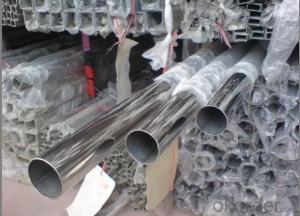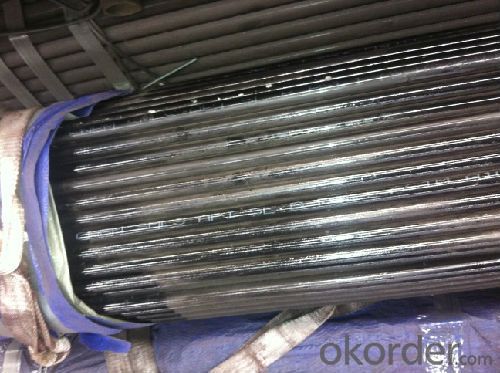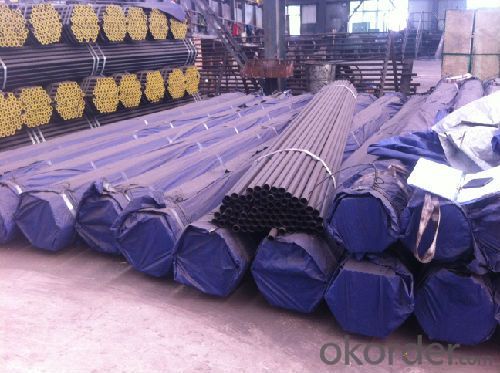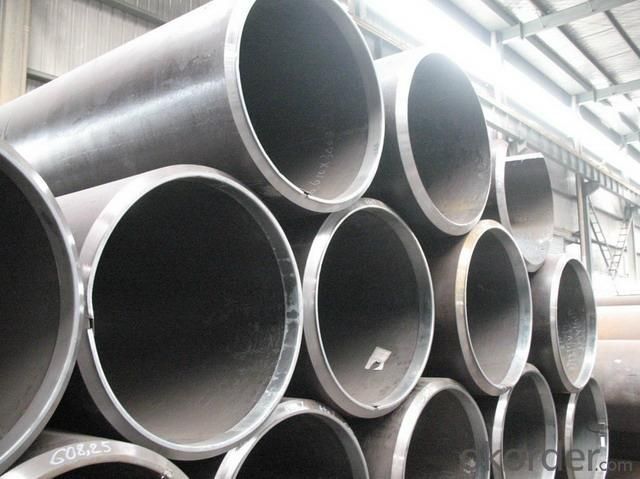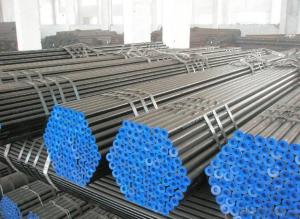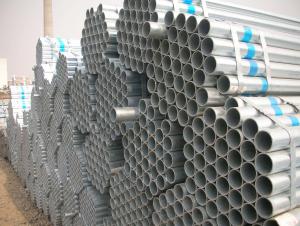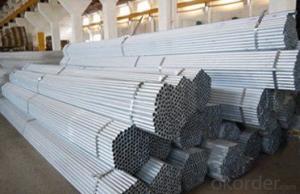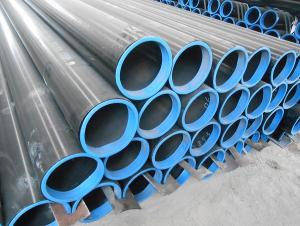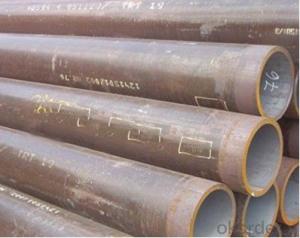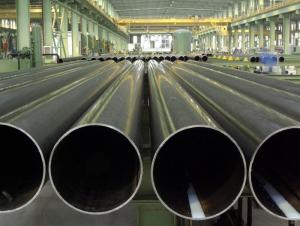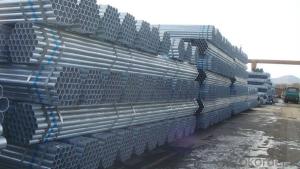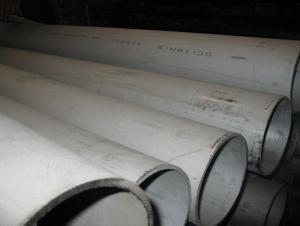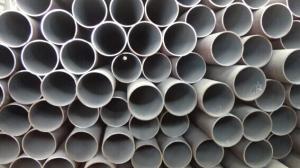Welded Stainless Hot Rolled Steel Pipes WIth High Quality
- Loading Port:
- China main port
- Payment Terms:
- TT or LC
- Min Order Qty:
- 100 kg
- Supply Capability:
- 10000 kg/month
OKorder Service Pledge
OKorder Financial Service
You Might Also Like
1、Structure of Seamless Pipe :
Seamless pipes are perceived to be stronger and more reliable. Historically seamless pipe was regarded as withstanding pressure better than other types, and was often more easily available than welded pipe.
2、Main Features of the Seamless Pipe ASTM A106/53:
•• Small inertia resistance
• Strong heat dissipation ability
High manufacturing accuracy
• High strength
• Good visual effect
• Reasonable price
3、Seamless Pipe ASTM A106/53 Specification:
Standard | GB, DIN, ASTM ASTM A106-2006, ASTM A53-2007 |
Grade | 10#-45#, 16Mn 10#, 20#, 45#, 16Mn |
Thickness | 8 - 33 mm |
Section Shape | Round |
Outer Diameter | 133 - 219 mm |
Place of Origin | Shandong, China (Mainland) |
Secondary Or Not | Non-secondary |
Application | Hydraulic Pipe |
Technique | Cold Drawn |
Certification | API |
Surface Treatment | factory state or painted black |
Special Pipe | API Pipe |
Alloy Or Not | Non-alloy |
Length | 5-12M |
Outer Diameter | 21.3-610mm |
Grade | 20#, 45#, Q345, API J55, API K55, API L80, API N80, API P110, A53B |
Standard | ASME, ASTM |
1) Material:20#(ASTM A 106/A53 GRB.API5LGRB,GB),45#,16Mn,10#.
2) Specification range:OD:21.3-610mm,WT:6-70mm,length:6-12m or according to the requirement of clients.
3) Excutive standards:GB,ASME API5L.ASTM A 106/A53,Despite of the above standards,we can also supply seamless steel pipe with standard of DIN,JIS,and so on,and also develop new products according to the requirements of our clients!
4) Surface:black lacquered,varnish coating or galvanized.
5) Ends:Beveled or square cut,plastic capped,painted.
6) Packing:bundles wrapped with strong steel strip,seaworthy packing.
Packaging Details: | seaworthy package,bundles wrapped with strong steel strip |
Delivery Detail: | 15-30days after received 30%TT |
5、FAQ of Seamless Pipe ASTM A106/53:
①How is the quality of your products?
If you want see our quality certifications and all kinds of testing report, please just ask us for it.
Guaranteed: If products’ quality don’t accord to discription as we give or the promise before you place order, we promise 100% refund.
②How about price?
We quote as lowest as possible for any customer, and discount can be given according to quantity”,if you like bargain and factory price is not low enough as you think, just don’t waste your time.Please trust the quotation we would give you, it is professional one.
③Why should you chose us?
Our service formula: good quality+good price+good service=customer’s trust
SGS test is available, customer inspection before shipping is welcome, third party inspection is no problem.
Any question, pls feel free to contact us !
6、Seamless Pipe ASTM A106/53 Images:
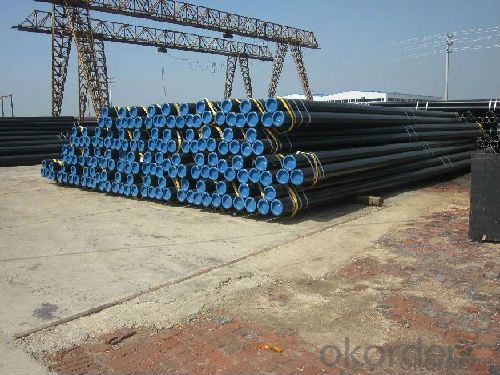
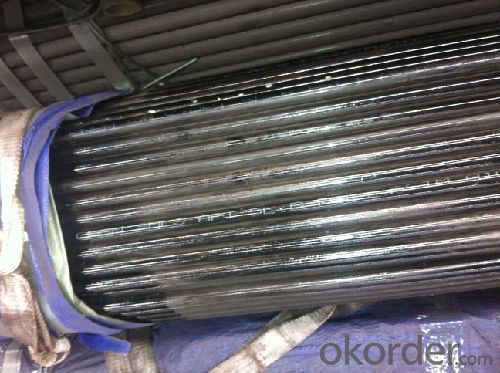
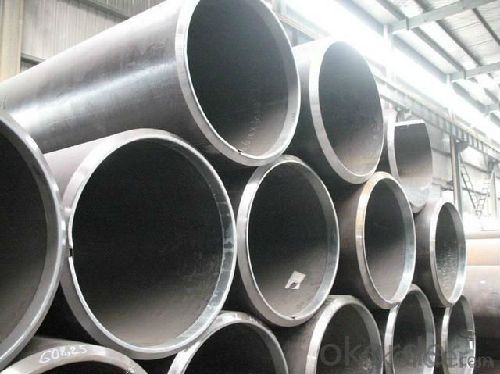
- Q: What is the difference between steel pipes and PVC-U pipes?
- Steel pipes and PVC-U pipes differ in their composition, durability, and application. Steel pipes are made from iron and carbon, providing them with high strength and resistance to extreme conditions. They are commonly used for transporting water, gas, and oil in industrial settings due to their durability and ability to withstand high pressure and temperature. PVC-U pipes, on the other hand, are made from a synthetic plastic called polyvinyl chloride. They are lightweight, corrosion-resistant, and easy to install, making them ideal for residential plumbing, irrigation systems, and drainage. While steel pipes are more robust and suitable for heavy-duty applications, PVC-U pipes are cost-effective, versatile, and suitable for lighter applications.
- Q: What does GALV mean in a steel tube?
- GALV is the abbreviation of English galvanized (Galvanized), which means galvanized steel pipe.
- Q: How are steel pipes used in the manufacturing of pressure vessels?
- Steel pipes are commonly used in the manufacturing of pressure vessels as they provide the necessary strength and durability to withstand high internal pressure. These pipes are welded or seamless and are often used as the main structural component of the vessel. They allow for the efficient flow of fluids or gases within the vessel and provide a reliable and secure containment system for various industrial applications.
- Q: What are the uses of welded steel pipes?
- The spiral submerged arc welded pipe (SY5036-83) for the delivery of pressurized fluid is made of hot rolled steel strips for tube billets, often spirally formed, welded by double submerged arc welding and used for the transmission of pressurized fluid. The steel pipe has strong pressure bearing ability and good welding performance. After a rigorous scientific examination and test, it can be used safely. The utility model has the advantages of large caliber of the steel pipe, high transmission efficiency, and investment in laying pipelines. Mainly used in the transportation of petroleum and natural gas pipelines.
- Q: How are steel pipes used in the telecommunications infrastructure?
- Steel pipes are commonly used in telecommunications infrastructure for the installation of underground cables. These pipes provide protection and support to the cables, ensuring their longevity and efficient functioning. Additionally, steel pipes are used for the construction of telecommunication towers, providing a sturdy framework for antennas and other equipment.
- Q: What are the different types of steel pipe joints?
- There are several types of steel pipe joints, including threaded and coupled joints, welded joints, flanged joints, and grooved joints.
- Q: How are steel pipes used in the transportation of liquids and gases?
- Due to their durability, strength, and resistance to corrosion, steel pipes find wide applications in the transportation of liquids and gases. Various industries such as oil and gas, water supply, and chemical processing commonly employ them. For the transportation of liquids, steel pipes serve as conduits for crude oil, refined petroleum products, water, and other fluids. These pipes are designed to withstand high pressure and maintain the integrity of the liquid being transported. The smooth inner surface of steel pipes minimizes friction, enabling efficient flow and reduced energy consumption. Moreover, the strength of steel pipes ensures that they can support the weight of the liquid without deformation or failure. In gas transportation, steel pipes are indispensable for the safe conveyance of natural gas, propane, and other compressed gases over long distances. These pipes are engineered to endure high pressures and extreme temperatures. They are also designed to prevent leakage, which is of utmost importance when dealing with flammable or toxic gases. The strength and durability of steel pipes make them ideal for withstanding the stress and strain that may occur during gas transportation. Additionally, steel pipes are frequently utilized in the construction of pipelines for long-distance transportation of liquids and gases. These pipelines can span hundreds or even thousands of kilometers, and steel pipes are the preferred choice due to their high strength and long-term reliability. They can bear the weight of the pipe and the substance being transported, as well as external forces such as soil pressure and temperature fluctuations. In summary, steel pipes play a vital role in the transportation of liquids and gases. Their durability, strength, and resistance to corrosion make them the preferred choice for conveying various substances over long distances. Whether it is for oil and gas, water supply, or chemical processing, steel pipes ensure the safe and efficient transportation of fluids and gases, contributing to the functioning of various industries and economies worldwide.
- Q: Can steel pipes be used for underground water wells?
- Indeed, underground water wells can utilize steel pipes. The selection of steel pipes is frequently based on their robustness and resilience, rendering them apt for enduring the exerted force and load of the encompassing soil and water. They are extensively employed in residential and industrial settings for the purpose of drilling and constructing water wells. Nevertheless, it is crucial to take into account specific factors including the steel's type and quality, along with the existence of corrosive components in the water, in order to ensure the durability and dependability of the well system. Moreover, adequate insulation and coating might prove necessary to avert corrosion and contamination of the subterranean water source.
- Q: How do steel pipes handle chemical substances?
- Steel pipes are highly resistant to chemical substances due to their inherent strength and durability. They can effectively handle a wide range of chemical substances without corroding or degrading. Additionally, steel pipes can be further protected by coatings or linings to enhance their resistance to specific chemicals.
- Q: Can steel pipes be used for heat transfer applications?
- Yes, steel pipes can be used for heat transfer applications. Steel is a good conductor of heat, making it suitable for transferring heat from one place to another. Steel pipes are often used in various heat transfer systems, such as in heating, ventilation, and air conditioning (HVAC) systems, as well as in industrial applications where heat needs to be transported efficiently.
Send your message to us
Welded Stainless Hot Rolled Steel Pipes WIth High Quality
- Loading Port:
- China main port
- Payment Terms:
- TT or LC
- Min Order Qty:
- 100 kg
- Supply Capability:
- 10000 kg/month
OKorder Service Pledge
OKorder Financial Service
Similar products
Hot products
Hot Searches
Related keywords
